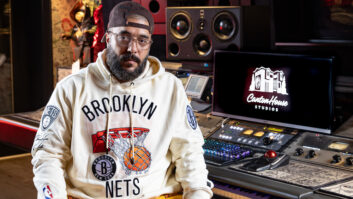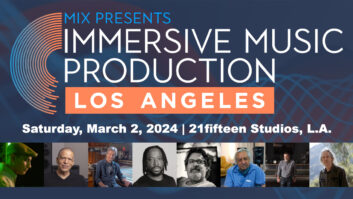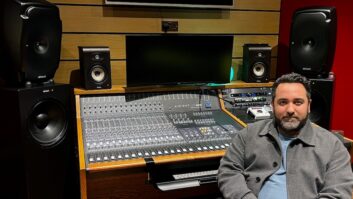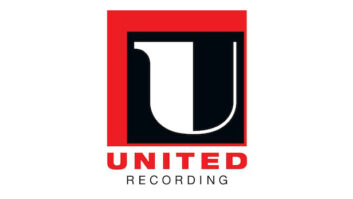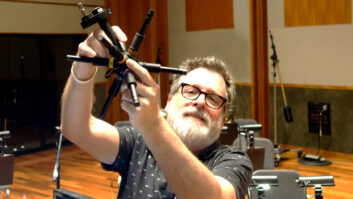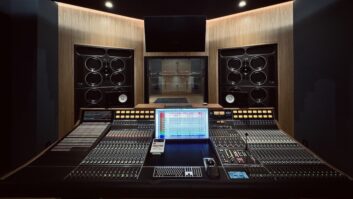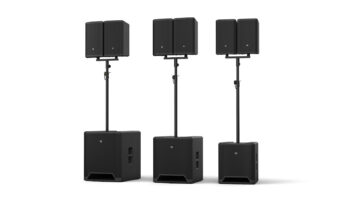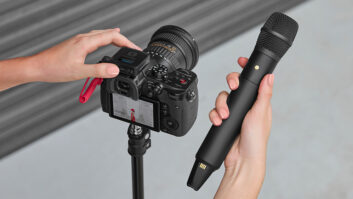The old song says that if you can make it in New York, you can make it anywhere. In recent times, though, more and more studios have found it somewhere between hard and nigh impossible to survive in the Big Apple. That’s not the case, however, for Galaxy Smith, a Greenpoint, Brooklyn-based venture founded just a few years ago by producer/engineer/musician Dave Brandwein. Sporting a sizable amount of gear and a varied mic locker, the studio is making a name for itself, so we sat down with Brandwein to find out what the latter half of Run-DMC was doing there, what exactly a Lomo is, and his advice on starting a studio these days.

Tell me a bit about your background—how did you come to start a studio?
Well as far back as I can remember I’ve been obsessed with music and all that goes into creating it. I love the idea of a good album, and more specifically from the time I was in high school and on, I decided that whether I’m the artist, producer, or engineer, I want to pursue my passion of putting together a great piece of work that makes a statement.
I’d say the desire to have a studio for me comes much more from the creative side of things than the business side, though obviously the two must go hand in hand. However because I’m a musician who writes and tours with my own band, I think I have a unique perspective as a studio owner. In fact, the studio started as a home studio with my friends/bandmates back in Boston before moving to Brooklyn. The idea quite simply was to be able to record our various ideas and projects without the excessive expense of most studios. Years later, it’s evolved into something a little different, but with a lot of the same ideas in mind.
Where does Galaxy Smith take its name from?
Once upon a time I fancied myself a solo musician and was looking to call the project something other than my name. I’d remembered a story that my sister told me from college involving someone with the first name “Galaxy”, and this had always entertained me. I thought “What’s the most typical last name I could slap onto such an unusual first name?” and of course “Smith” came to mind. It was around this time that I was building the home studio in Boston and began thinking of it as a bit of a musical collective. When I no longer needed the name for anything else, it soon became obvious that this was the best name for the studio and the collective itself.
Since then, I’ve also come to enjoy certain qualities of the name. Most of all that it combines the extraordinary with the ordinary. It suggests presenting large concepts in simple and down-to-earth ways. I think in some ways this speaks to what we aim to do.
Over the last few years, New York City has seen a lot of studios close their doors, yet you jumped into the local market and have prospered despite the economy. How did you get the word out about the studio, and how did you build upon that first interest?
After developing a community of people up in Boston, or “collective” as I mentioned before, there was certainly a built in group of musicians, who moved to New York around the same time I did, always looking to pursue new projects. Additionally, I built/worked out of another studio in NYC for a year or so before opening Galaxy Smith in Brooklyn. Both of those previous experiences were definitely a help in acquiring a baseline of clients upon start-up. Lastly, we have two other engineers with their own histories and circles of musicians who contribute to booking the studio and enriching our community as well. This got things started as far as “word of mouth”.
Oh and also.. we keep it affordable!
I suppose hand in hand with that, Galaxy Smith seems to do a lot of social media—besides your website, you guys are on Facebook, Twitter, Tumbler, YouTube and even forgotten old MySpace. Do you feel it has made a difference for your studio, or is it just a given that you’d use social media these days to spread the word?
I think it helps. The fact is that musicians, and really everyone, spend a lot of their time exploring social media these days for whatever reason. Facebook and Twitter are amazing tools for promotion. They are certainly not for everybody, but I think having a presence there is pretty essential to staying fresh in people’s minds, and being able to update them regularly on what you’re up to. It’s really nice in a way to have an artist in the studio doing something exciting, and being able to share that information with almost everyone we know. The idea isn’t to diminish the anticipation of the work you’re doing, but to enhance it.
Every studio prides itself on its inventory; what’s your favorite “go-to” pieces of gear that you find yourself turning to time and time again for recording?
One insanely interesting piece of gear that we have, which gets used time and time again, is what we call the “Lomo”. We call it the Lomo because it’s a stereo preamp made from a “Lomo” Russian broadcast console, but it’s pretty much been gutted and heavily modified by a guy named Chip Verspyck up in Rhinebeck, NY. It’s definitely a potent character piece! The analog distortion that can be attained from using this thing is insane. If you crank the gain on it and keep the output low, the result is quite astonishing!
Of course we have no shortage of beautiful preamps and microphones, but I also feel particularly happy about our diverse range of amplifiers and instruments. We have all types of amps from a ’51 Fender Champ, to a Marshall Half Stack. We have a Rhodes, Hammond Organ, piano and some great drum kits in-house. All of these things as well as most noticeably our live room, contribute greatly to the Galaxy Smith sound. (Our tape machines are nice too!)
Your site makes a point of noting that you’ve recorded a wide variety of genres there; what’s the most unusual session that’s taken place in Galaxy Smith?
We’ve done Metal, Bossa, Soundracks for musicals…. Indie Rock, Hip Hop, Jazz, High School Hardcore bands, Professional voiceovers.. We’re not kiddin’ about wide variety!
What are some of the ways you facilitate a band achieving what it wants when it comes into record?
I think a big part of this is communication beforehand. It helps to really ask the artist to pinpoint the sounds they’re going for right when they enter the studio. We can make our room sound like a giant cathedral, or a tiny little box. It all depends. Having audio examples of what the artist is picturing is often helpful. And when I produce or engineer an artist this is one of the first things I address. I think a lot of confusion lay in artists thinking that all that stuff happens in mixing, when really it’s the tracking process that dictates the authenticity of those sounds. But a lot of this comes back to versatility of our room. We have a signature sound in some ways but we are by no means married to it. We love experimenting and broadening our horizons.
Who are some of those acts that have passed through the studio’s doors at this point?

I had the thrill of recording Hip-Hop legend DMC of Run-DMC at Galaxy Smith. He came in to record with our good friends Hollis Brown, another NYC band. Not only did they record there but they filmed a music video as well.
One of our other engineers, Jim Bertini, has recorded a fellow by the name of Peter Stampfel on several occasions. Peter is know as the guy who invented “freak folk”. He’s now in his early seventies and he’s still at it. Founding member of two historic bands: The Holy Modal Rounders and the Fugs.
Some more NYC bands: Dopapod, Futurist, Zongo Junction, Turkuaz, Emily Greene, Sticklips, Uptown Party Down, Rocket and The Ghost, The Kickdown, MUN, Zozo Afrobeat, Nicky Egan, Little Electric, The Tales, Lily and the Parlour Tricks and many more!
What’s next for you/Galaxy Smith?
Well, we never stop improving. Each month we assess where we are and we lay out clear goals to get us where we want to be. I think if anything, we’re trying to get back to our roots in the way of enhancing our sense of community.
Recently our studio manager and videographer Dani Barbieri, started doing a video series for us called “In The Studio” where we feature artists doing a live in the studio performance of a song of their choice. Usually these songs are a little on the mellow side, but in the months to come we’re planning on doing some more elaborate things with these videos. Usually artists that participate in this have recorded with us in the past, and so we invite them back to do these videos free of charge as a bit of a thank you.
Similarly, in coming months Dani and I are looking to provide more video content to artists when they come in to do a full album with us. We also wanna continue to interact with artists more and more in terms of social media, live music, and remaining a part of their careers as they progress.
I have a lot of exciting things coming into the studio that I’m actually producing as well, which gives me the thrill of working with our other engineers. It’s really nice when a bunch of us at Galaxy Smith get to all work together on the same project. This summer I’m finishing up some older projects and getting started on some new ones that I’m really looking forward to, including one from my own band, Turkuaz.
Lastly, we’re planning some sort of 2 year anniversary party on our beautiful rooftop this summer. Plans are in the works! There will be live music, food and drinks, and it will all be set along the beautiful backdrop of our pristine Manhattan skyline view!
To close things out, any advice for folks thinking of starting their own studio?
I guess it kind of comes down to demand and creating a unique space. I think a lot of the reason that some bigger studios are closing their doors is because as people find themselves with the tools and the time to make interesting recordings at home, they’re no longer convinced that they need to spend insane amounts of money on hourly studio time. I think in our case, as the founder of the studio I approached it with a deep understanding of that concept and I set out to make a studio that was affordable, maintained noticeable character like a home setup might do, with the quality standard of a top industry studio. This also comes down to talent in engineers, and knowledge of what one has, and not necessarily thinking there’s a right and wrong way to do things.
I also think a sense of community makes it all possible, and that idea will continue to be essential to any start up studios from here on out. A studio cannot exist without a rich culture of music around it full of creative people and good ideas. We try to create these ideas as well as absorb them. We are very excited to see what the future holds both for us, and for the music industry in general.
